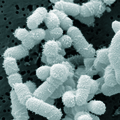Food process engineering
TUM researchers develop environmentally friendly process to improve storage stability of probiotics
06.07.2011, Press releases
You will find them in yoghurts, muesli blends and infant formula – probiotic bacteria are rapidly gaining ground as healthy food supplements. However, the production of this “functional food” has its pitfalls: Only few probiotic bacterial strains are robust enough to survive conventional production processes. Process engineers, together with microbiologists from Technische Universitaet Muenchen (TUM), have now developed a particularly gentle method that allows the use of thus far unutilised probiotics in the future. The outcome is beneficial for both manufacturers and consumers: On the one hand, it is both energy and cost efficient; on the other, it makes probiotics less perishable.
Probiotics, as functional supplements, are good for both the immune system and for intestinal health. But how do they get into the yoghurt jar? So far, probiotic bacteria are mostly freeze-dried, before they are used in high concentrations in foods. However, the freeze-drying process is problematic – for some probiotics it means certain death, and it is also quite energy consuming. The probiotics must first be frozen and in a second step heat is inserted in the sample to transform the ice directly into steam. Thus water is removed from the bacterial culture. The TUM researchers from the Chair of Food Process Engineering and Dairy Technology decided to save themselves this “detour” and tried to find a drying process that is both gentler and more environmentally friendly.
That is how the TUM researchers came across low temperature vacuum drying (LTVD) – a process that runs under mild conditions. The product remains in a liquid state, since in a vacuum the evaporation takes place at low temperatures: For instance, water boils at 8°C in an atmosphere of 10 mbar air pressure. Compared to freeze-drying, this method requires 40% less energy. Dr. Petra Först’s team at the Chair of Food Process Engineering and Dairy Technology conducted experiments on this process using three probiotic bacterial strains. The TUM researchers first determined the optimal LTVD conditions and then, in a second step, compared the results with conventional freeze-drying.
The results were unexpected: Low Temperature Vacuum Drying resulted partially in a higher survival rate than conventional drying. For instance, the yoghurt strain Lactobacillus bulgaricus, which barely survives freeze-drying, showed a ten times higher yield following LTVD. The new process will allow health-fostering probiotic “candidates” that are too fragile for conventional manufacturing processes to be used in the food industry. Conversely, it turned out that probiotics that handle freeze-drying very well, performed poorly in low temperature vacuum drying. To cut a long story short: The optimal drying process depends on the respective bacterial strain.
Dr. Jürgen Behr and his research team at the TUM Chair of Technical Microbiology focused on the molecular background of this phenomenon. They looked into possible differences between bacterial strains that might explain the disparate behaviour during drying. The secret could be traced back to the bacterial cell membranes, which protect the bacteria from environmental influences. The researchers demonstrated that in probiotics this adaptable “shield” has a different fatty acid composition for every bacterial strain. The researchers can now even control this composition by adjusting the cultivation conditions before the drying process. In an experiment they successfully increased the survival rate of a bacterial strain by about 50% – merely by optimizing growth conditions.
The low temperature vacuum drying process is not only the most energy efficient one; it also has a positive influence on storage stability. Compared to probiotics from conventional freeze-drying, probiotics in powder form produced using LTVD keep significantly longer in mueslis or infant formula once the packaging is opened. Thus, more active bacteria remain in the product until it is consumed, even when stored under unfavourable conditions.
Contact:
Technische Universität München
Chair of Food Process Engineering and Dairy Technology
Prof. Ulrich Kulozik / Dr. Petra Först
85350 Freising-Weihenstephan, Germany
Tel: +49 8161 / 71-3535 or -3536
E-Mail: ulrich.kulozik@tum.de / petra.foerst@tum.de
http://www.lebensmittelverfahrenstechnik.de/
References:
Foerst, P.; Kulozik, U.; Schmitt, M.; Bauer, S.; Santivarangkna, Ch: Storage stability of vacuum-dried probiotic bacterium Lactobacillus paracasei F19. Food and Bioproducts processing, Online-Prepublication at http://www.sciencedirect.com/science/article/pii/S096030851100054X (doi: 10.1016/j.fbp.2011.06.004)
Bauer, S.A.W.; Schneider, S.; Behr, J.; Kulozik, U.; Foerst, P.: Combined influence of fermentation and drying conditions on survival and metabolic activity of starter and probiotic cultures after low-temperature vacuum drying. J. Biotechnology, Online-Prepublication at http://www.sciencedirect.com/science/article/pii/S0168165611003099 (doi: 10.1016/j.jbiotec.2011.06.010)
Background:
The research project “Development of a Low Temperature Vacuum Drying Process for the Production of Starter Cultures” was funded from April 2008 until December 2010 with altogether 350,000 EUR by the Federal Ministry of Economics and Technology and the Research Association of the German Food Industry (FEI). The results are now available to small and medium-sized companies, which often lack their own research department.
Kontakt: presse@tum.de
More Information
| 110706_Starterkulturen_PD.pdf |
Druckversion dieser Pressemitteilung,
(Type: application/pdf,
Size: 107.2 kB)
Save attachment
|
|
| 110706_starter-cultures_PD.pdf |
Print version of this press release,
(Type: application/pdf,
Size: 97.5 kB)
Save attachment
|




